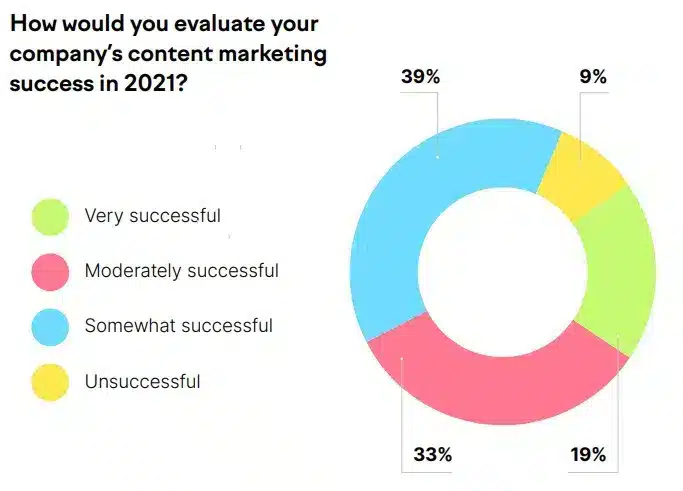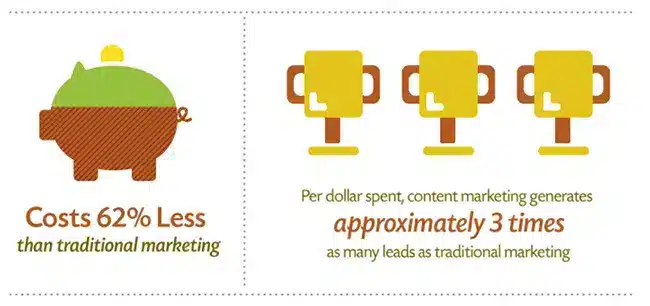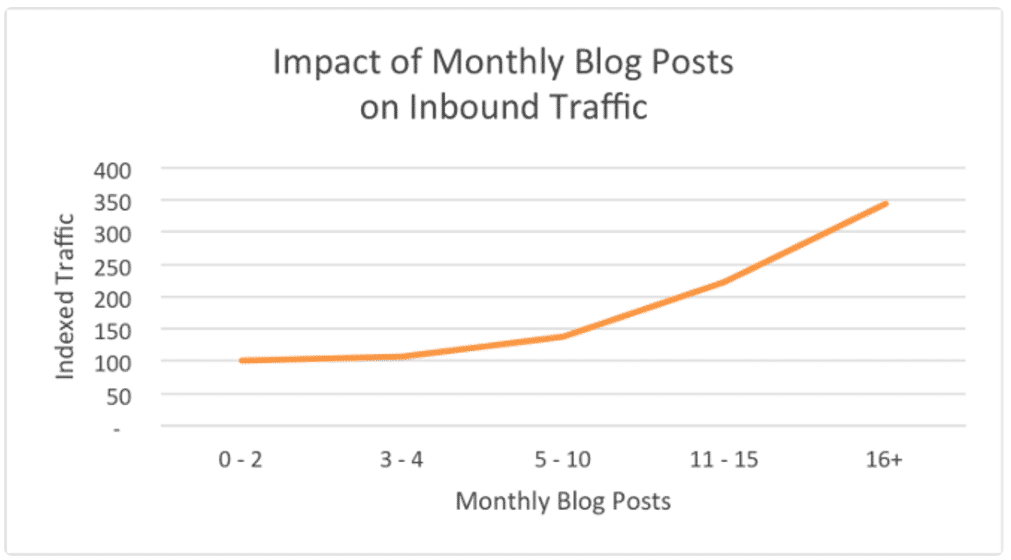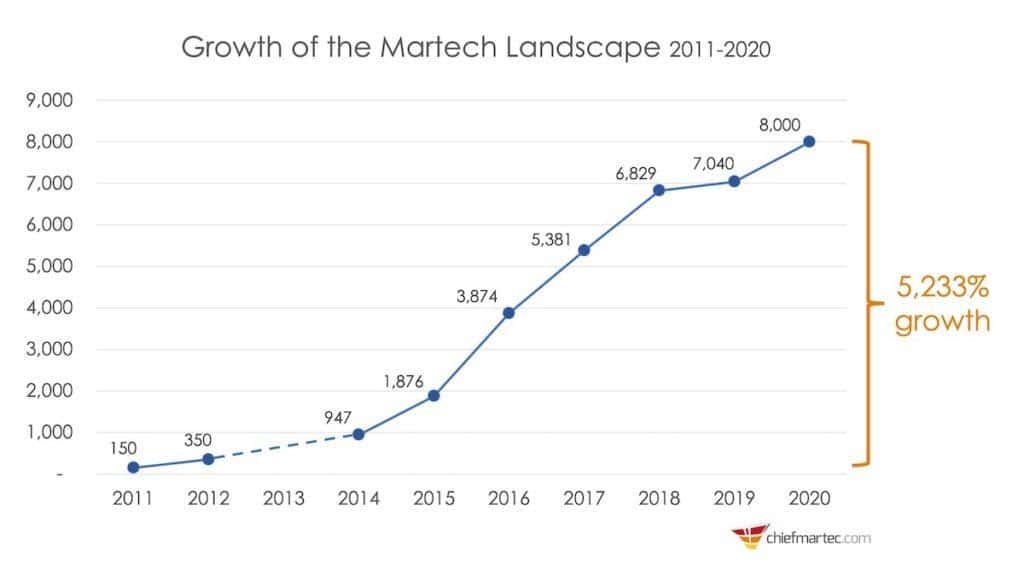
Do You Need a Content Marketing Agency? How Do You Find the Right One?
Every week I speak to startup founders, B2B marketers, and consumer brands who are struggling to break through in this crazy and noisy world.
They’re all looking to find a top content marketing agency to help them grow their business.
Why? Content marketing is one of the most powerful ways to build a brand and connect with customers online. Consider this: content marketing has proven to be 3x more effective than traditional marketing, and it can increase your organic traffic, grow your brand, and boost your conversion rates six-fold. Most importantly, it positions your brand as a thought leader in your industry — one that your potential customers will feel like they can trust.
With those kinds of results at stake, many businesses hire a professional content marketing agency to handle it for them.
Finding the right content marketing agency is worth the effort. It can be daunting for sure. It seems like every agency offering any type of marketing-related services claims to “do” content marketing, and finding the real experts isn’t easy.
When you aren’t sure how to optimize your content and strategy, you risk dedicating a lot of time in exchange for mediocre results. In fact, a recent Semrush report states that only 19% of businesses felt their content marketing was “very successful.”

Image Source: SEMRush
What does a content marketing agency do to correct this problem? In short, the firm works with you to execute a content strategy that earns you search rankings, organic traffic, and new customers. An agency also helps to ensure you get the highest possible return on investment from your content.
If you’re considering hiring a content marketing agency, you’ve come to the right place. We help our clients get millions of website visits every month and can help you boost your online visibility.
Key Takeaways:
- Mediocre content will never boost lead generation or drive engagement.
- Most organizations aren’t equipped to create high quality content on their own.
- It’s easy for SEO and PR firms to claim that they “do” content marketing but most of them don’t have the expertise to do it effectively.
- A specialized content agency will actually help you save costs on content creation and distribution.
- You need to find an agency that has an undying focus on business goals, understands your niche and your audience, and can serve your future needs too.
- Hiring an agency can be more affordable than executing content marketing internally.
- Professional alignment is just as important as the services an agency delivers. It’s important to find an agency that understands your vision and whose communication and delivery styles work for your brand.
- The best content marketing agencies provide frequent, detailed performance reporting.
What Makes a Good Content Strategy?
The foundation of a strong content marketing strategy is quality content. Seems obvious, right?
Maybe so, but you’d be surprised at how many companies settle for churning out mediocre content stuffed with keywords and full of invisible text. It isn’t 2008, and real content marketers have moved on from using outdated tactics to help companies get results that can sometimes look good on paper but don’t really drive the kind of traffic they want.
Instead, content marketing uses regular, high-quality, genuine content to actually achieve results from a well thought-out strategy. It doesn’t happen overnight, or even in a month. It takes time, effort, and commitment. But good, consistently delivered content can transform your business’s potential and open the door to exponential growth.
Which leads to the number one content problem for businesses and agencies: if your organization doesn’t already have in-house content creators, where does this quality, original, hyper-relevant, value-driven, expertly-crafted content come from?
The answer: content marketing agencies. Let’s dive into why every agency wants in on the content marketing game, how you can spot the real thing, and how a good content marketing agency can seriously grow your business.
How Does a Content Marketing Agency Help Businesses?
A content marketing agency works with you to build your brand through positive attention. Before you can appreciate what an agency does, you must understand the power of marketing through content.
The Right Kind of Content Marketing
Content marketing involves creating consistent, high-value content that drives organic traffic to your website and ultimately earns new customers. Content itself is nothing new; brochures, catalogs, flyers, guidebooks, and other traditional marketing pieces all fall under the category of marketing content.
However, digital content that you tailor for search engine optimization has more power than any other kind of traditional marketing. Here’s why: authenticity.
SEO content naturally attracts the right users to your website and your brand. You provide value to those users and build trust in your brand before your audience ever makes a purchase, leading to stronger customer relationships.
SEO content also demonstrates your expertise and value proposition, and it helps you establish your brand reputation. Ultimately, your content drives more traffic, leads, and conversions to your website, resulting in more sales and revenue for your business.
The numbers speak for themselves: research shows content marketing generates three times the leads and six times the conversions of traditional marketing methods. SEO-optimized digital content does all this while being 62% more cost-effective when using a content marketing agency.

Such results are not out of reach for your business. Content marketing can unlock many new opportunities and transform how your brand connects with potential customers online. You just have to know two things: how to get started and how to execute a content strategy correctly.
That’s where content marketing agencies come in.
What Does a Content Marketing Agency Do?
Content marketing agencies create content for businesses that attracts new customers through SEO. This content usually includes blog articles but could also include ebooks, infographics, videos, white papers, and more. These marketers work directly with their clients to learn about their target audiences and develop content ideas that will resonate and create a following.
Content marketing agencies like Marketing Insider Group offer a more comprehensive set of services along with content creation. Such services include keyword research, SEO audits, content calendar development, publishing, and frequent performance reporting.
These services are the primary benefit of hiring a content marketing agency over freelance writers or putting together your own in-house team. With an agency, you get content, expertise, a customized strategy, and support in the execution.
The strategy piece is especially important. Brands with a well-developed, documented content marketing strategy consistently perform better than those without. For example, one study recounts that 78% of marketers who reported successful content marketing efforts had a documented strategy. Conversely, 81% of those that were unsuccessful did not have one.

Of course, hiring a content marketing agency is an investment. Working with the experts still requires time and energy on your part to build and maintain your strategy, and you’ll have the obvious ongoing cost for services. Still, for businesses needing content marketing support, the ROI far outweighs the time and financial expenses.
Why Should You Work with a Content Agency?
Working with an agency isn’t just about seeking a high level of content. There are a lot of practical reasons why you may want to hire out rather than handle content in-house.
Here are nine reasons to consider taking the leap and hiring an agency.
1. Focus on Your Core Business
Running a business is a full-time job, as is creating high-volume, high-quality content on a consistent basis. When you try to do both, unfortunately both often suffer.
A content marketing agency is continually evaluating the latest trends. They do all the research and analysis needed to develop a successful marketing strategy for your brand. Then, they create and distribute your content for you. This saves you the time of gathering, writing, and publishing your content.
No amount of content marketing in the world can make your business successful if you can’t consistently provide a great product. When you hire a content marketing agency, you can be confident in the execution of your strategy while you focus on the most critical part of your business: serving your customers.
2. Take Advantage of Cost Savings
This might initially sound hard to believe, but it’s true: Hiring an agency can save you money, especially if you’re choosing between an agency and a new in-house team to handle content.
Hiring in house requires paying salaries and benefits, providing office space and equipment, and managing a team. Once you hire your team, it’s hard to grow it or downsize quickly. On the other hand, you pay a content marketing agency a fixed ongoing fee to handle everything for you. When you work with a reputable agency, you pay only for the content you need for your organization without having to worry about the costs of onboarding and training, benefits and a full-time salary.
For example, you would likely have to hire at least two or three people to create SEO-driven content ideas, write articles, edit those articles, provide keyword strategy, generate reports, and offer a strategy review. An agency such as ours gives you all of those features for less than the expense of one salary.
An agency also allows you to easily scale your efforts up or down as your budget or business demands. You’ll never have to spend more than what you need to execute your strategy.
3. Publish Frequent and Consistent Content
Frequency and consistency in publishing are two of the most significant factors in determining how much traffic your content will drive to your site. Did you know getting the best possible SEO results requires publishing 11 to 16 times per month? HubSpot found that companies publishing at that frequency earned 3.5 times more traffic than those doing so less often.

If you consider that it takes about three to four hours to write an average blog post, you’re talking over 60 hours every month spent just on writing. When you’re handling content marketing in addition to other business responsibilities, getting off schedule is easy.
When you hire a content marketing agency, you’ll never experience a lag or gap in your content publishing plan. For example, we help dozens of companies publish an article or two every week without exception.
4. Broaden Your Content Strategy
Instead of limiting your strategy by the skills of your in-house team, you can work with an agency to have all of your content needs fulfilled by experts. You may have someone in-house to develop well-researched white papers and blog posts and a talented digital illustrator to create infographics, but with a content creation agency, you can access the full spectrum of specialized skills that go into developing great content where there are gaps in what your in-house team can do.
5. Add SEO Expertise to Your Content
Search engine optimization is about more than just keywords in the modern digital era. Google’s algorithms are smarter than ever, and they’re looking for content that not only checks the right SEO boxes but also provides real human value. A content marketing agency has the expertise and experience to help you strike the right balance.
Why? Because they have a collective experience and skill set. They’ve tried numerous approaches. They’ll know the best way to develop strategized content for your business. They also have a well-rounded team working for you. They can provide a wealth of knowledge on multiple content topics.
Keep in mind, too, that Google ranking factors constantly evolve. Google updates its algorithm thousands of times every year. You need to keep up with it for your SEO to work. Hiring an agency means you can be confident that your content aligns with the latest SEO standards.
6. Get Access to the Right Tools and Resources
When you hire a content marketing agency, you invest in more than just content. You’re also gaining access to a range of resources that help inform and scale your strategy and boost your results.
When you need to quickly increase your content for a new campaign or beef up your overall strategy, a content agency will have the resources to cope with the extra work. Agencies use tools such as Semrush, Ahrefs, ChatGPT and Google Analytics to power your content marketing and carry out functions such as keyword research and performance analytics. In addition, agencies have full teams of writers and SEO experts who contribute to your content strategy and creation.
We’ve collaborated with numerous firms to help them identify the most profitable customers and discover their pain points and what they’re searching for on the internet. We then craft a content strategy that incorporates this knowledge and launch a fitting campaign.
Further, content marketing is only successful if it reaches the right people at the right time. It can be challenging to build relationships with publications that target your audience. An agency can provide a list of contacts to help deliver your message effectively.
7. Acquire New Perspectives and Ideas
Bringing in a new content marketing team gives your brand a fresh perspective on the tactics and approaches that may have become second nature to you. Agencies are both objective (using data-driven research and reports to build strategy and measure results) and creative (developing new ideas for blog topics and other content pieces).
A content marketing agency has no personal ties to the inner workings of your business. This perspective gives them the freedom to offer insights and recommendations. They can identify missed opportunities without the pressures of internal bias or loyalties.
8. Receive Detailed Performance Reporting
Performance reporting is the main way a content marketing agency can demonstrate its value and effectiveness. With reports, you can expect frequent and detailed reporting showing your content marketing performance against KPIs and your overall return on investment from the agency.
We can’t overemphasize the value of getting data-driven insights on a regular basis. This data helps you capitalize on what’s working, pivot your strategy when necessary, and prove the value of your investment to company leadership.
9. Ability to Stay on Top of Marketing Trends
When looking for a content marketing agency, make sure the people you are talking to have been in the industry, have led client-side content marketing projects, and have the ability to build the business case you need to succeed, to develop the content your audience wants, and to measure results your executives want to see.
Why Finding the Right Agency Isn’t Easy
The challenge for most companies is identifying a stellar agency that truly has the content marketing capabilities to achieve results. There are quite a few agencies out there that have rebranded themselves as content marketers to meet industry demand and grow their own businesses.
But many times, while they may excel in other areas of marketing, they don’t necessarily “know” content marketing. SEO and social media strategists, digital advertising firms and website design services – a quick search will reveal dozens of these cross-specialty agencies that have started offering content marketing in addition to their bread-and-butter services. Many agencies whose core business is SEO or PR will claim they can “do” content with little experience or expertise.
This blurs the lines and makes it difficult for companies to know the true-blue content marketers from other marketing professionals who are offering content services. But there’s a big difference between the fakers and the makers out there, and that difference will translate into real content marketing ROI.
How is a company seeking content marketing services supposed to know who does it well and who doesn’t? And why would agencies say they do content marketing without the know-how in the first place?
Clearly, an opportunity is there for agencies to step in and help brands implement the content marketing strategies they can’t execute on their own. As a result, content marketing is suddenly appearing as a service many agencies provide, even if they don’t actually have experience or expertise in this specific area.
What to Look for in a Content Marketing Agency
There are plenty of content creation agencies out there, but not all of them will be ideal for your brand. Here are the factors you want to consider to make sure you connect with the right one.
Well-Written Content
A good content agency should know how to tell their story themselves, and do it in an interesting way. That means clearly outlining services and their process, providing some helpful case studies and content to help you evaluate them and make a decision.
In our opinion, great writing is a non-negotiable must-have. Even if you’re creating infographics, video or less copy-oriented content for social media, the agency you hire has to be able to string together the words to tell the story.
Clear Strategy and Process
Content marketing is more than writing a few blog posts. It takes an understanding of the buyer’s journey and the client’s goals. Content marketing experts will help you figure out who to talk to, when to talk to them and what to talk to them about. And a content process will help you get from ideation to publishing and distribution smoothly.
An Audience-First Approach
Buyers are totally in control of the process these days, which means content needs to be helpful, not promotional — at least at the top of the sales funnel when you’re trying to attract attention and build trust. Audience-first means you have to figure out what your audience wants during every step of the buyer’s journey, and a good content marketing agency will know how to guide you.
Subject-Matter Expertise
How successful has your content creation agency been in the past? What kind of content have they made for other clients in your industry? The only way to win at content marketing is to have a very firm grasp of the industry you’re writing for, and even the best content marketing agency on the planet may not be the most suitable for your organization if they don’t specifically excel in your niche.
Look for case studies within the industry or work that’s been done with clients in a similar space. A content marketing agency can’t produce “high-quality content” without understanding the obstacles your customers face and the unique aspects of your industry.
Of course, there are some SEO, PR and digital agencies that really can do content marketing, too. But it’s crucial to figure out who’s doing the work and what their experience is before working with them. Otherwise, you risk wasting money at best, and damaging your brand at worst.
Ability to Serve Your Current and Future Needs
It’s not just about the content you need now, but also the direction you are heading when it comes to your content. For example, if you work with a content writing agency that produces blog posts and social media posts, will they be able to write the scripts for your video series you were planning for next year or will you need to find another content provider?
Think about your company’s priorities for both now and in the future, and be sure your content marketing agency has all of the capabilities needed to meet them.
An Undying Focus on Business Goals
One way to distinguish a standard content creation agency from one that knows its salt is intent – are they just amazing at producing great content, or are they also working to align content with your brand’s specific marketing goals?
Ideally, your agency will be able to deliver tailored content for your distinct objectives. As your objectives change, your agency should be working with you to tailor your content to meet those evolving goals instead of simply churning out the same content.
A Strategic Mindset
Real-deal content marketing agencies offer more than just high-quality videos and optimized blog posts. They also help you build smart, data-driven strategies that achieve measurable results.
If your content marketing lacks strategy, you risk diminishing the impact of each piece of content and every dollar invested. When it comes to being able to deliver a winning strategy, you want to see a foundation of research and data, funneled through creativity, skill and foresight.
Actionable Buyer Personas
One useful litmus test we recommend for evaluating content marketing agencies is asking to see samples of their buyer personas for other clients. The actionability of their buyer personas is a good indicator of how far they’ll go to understand your customers and make sure a positive customer experience is felt throughout your content.
Personas with a lot of detail, that are updated regularly, and that draw upon both qualitative and quantitative customer and market research are hallmarks of a good strategy.
Excellent Storytelling Skills
Your brand’s story is the thread that strings together all of your content. Really proficient content marketers will be able to identify and express your brand’s history, personality, and vision better than you can.
A Creative Approach to Repurposing Content
Repurposed content isn’t just about recycling good content to squeeze more out of your content budget. It’s a way to emphasize your message and deliver a more holistic experience for your customers. If your content isn’t being repurposed creatively, you’re missing out on the benefits of having a really good multi-channel strategy.
A lot of resources go into your in-person events and heavy-research white papers – how will these big hitter content pieces be reformatted into infographics, ebooks, podcasts and blog posts? Ideally, your agency will take a creative approach rather than using a standard recap format for repurposed content.
For example, you might use surveys and gather quotes from participants and speakers at your marketing events to use for infographics and unique social media posts that will keep your audience interested months after the event. This kind of tactic goes a lot further than merely posting a recap blog about the event.
Ongoing Strategy Assessment
Once your content marketing strategy is implemented, what system is in place for measuring its reach? You want more than a documented strategy and reporting on metrics. How will your content marketing agency evaluate how well both the strategy as a whole and its individual moving parts are doing? What is the process for refining the strategy as needed?
This is where the use of an agile marketing methodology is helpful. But, even if your agency doesn’t use agile methods, you still want to see a level of flexibility and a process for tracking and responding to missed benchmarks.
Tech Mastery
One of the most important qualities to look for in your content marketing agency is being well-versed in marketing technology. You want more than vanity metrics and flashy campaigns — you want a deep understanding of what can be done today, how martech is evolving, and what is possible in the future.
Right now, martech is evolving all facets of marketing, including content, faster than most of us are aware of. It’s critical to have an agency that is aligned with this reality on your side and that is proactively implementing leading technology tools to improve their work and their content.

Image Source
Alt-Text: Line graph showing martech landscape growth 2011-2020
Marketers have to move out of their comfort zone in order to think like data scientists, so it won’t necessarily be easy to find agencies whose strongest quality is being tech adept. But the ones that do? They can deliver the ROI you’re seeking.
Vision and Attention to Detail
The best content marketing strategies stand out because every nuance – everything from email subject lines to in-depth case studies – all perfectly fit within your strategy, express the unique personality of your brand, and reflect how your company meets customer needs.
This means every piece of the puzzle needs to be well thought out as to its purpose and how it supports, complements or enhances other facets of the content strategy.
The Right Content Services and Solutions
Content agencies sometimes offer expanded services that go beyond delivering content and content strategy, like web design or social media management. Evaluating an agency’s complete set of services can help you decide which is best for your company.
But remember: if there are services you want out of an agency that they don’t provide, it doesn’t need to be a deal breaker. In fact, there’s always a risk with a jack-of-all trades agency, and agencies who claim to do everything when it comes to marketing may not excel in specific areas the same way specialized agencies do.
Good agencies will answer your questions about their services honestly and be able to give you examples and client testimonials to back it up. If they can’t provide a specific service you need, they’ll refer you to other agencies in their networks who they know to be reputable and capable.
Potential Content Marketing Agency Problems
Content marketing can be achieved with the help of an agency. It could also be done by an internal team. Before you decide which is best for you, do your homework. Here are four little-known facts about content marketing agencies.
PS – Check out our latest case study that shows how we helped one company double their leads!
1. There’s a Learning Curve
A professional agency brings diverse experience to your projects. However, no one knows your brand better than you. Before committing to a long-term relationship, discuss your business in detail. Find out whether the agency has worked with brands in your industry.
Keep in mind an agency will need a little time to become well-versed in your field. As you set your content calendar, allow padding for edits, rewrites, and polishing in the beginning. It shouldn’t be long before the agency is creating quality content that resonates with your audience.

Source: Athletic Institute of Excellence
2. Transparency
When you outsource your work, you surrender some control. While this can be hard, it doesn’t have to be a negative. Employ an agency that understands the balance of taking the lead while keeping you informed.
Hiring a content marketing agency doesn’t mean you have no say over your messaging. There should be checkpoints where you give approval and feedback. A strategy shouldn’t be implemented before you know what it is.
If you find yourself in a relationship without transparency, you might have to reconsider your agreement. An agency should be able to explain their strategy clearly. They ought to come to you for consent. If they don’t, they may not be a reputable company.
3. They May Sacrifice Content Quality
Hiring a content marketing agency can be pricey. As you may expect, fees are typically charged hourly or per package. What you may not know is that many agencies use freelance writers. These writers charge the agency their own rates. Then, the agency has to mark up their cost to cover the fee of the writer and any other project expenses.
Depending on your budget, an agency may have to employ the cheapest writer available. Not the best one for the job. This could mean you’ll be getting a writer with less experience. This may result in more mistakes and more work. When discussing fees, be sure to ask about writer experience and how it correlates with your budget.
At Marketing Insider Group, we only hire the best writers. And then we treat them like the best. We respect their rates and experience. We do not force them to join client calls. We let them do what they do best: write. They also love that our clients are n it for the long term. So they can become experts at the tone and topic needed for each client.
PS – Check out our weekly blog content service to grow your website traffic and leads!
4. They Might Bump Your Priority
Content marketing agencies only have so many writers. As assignments come in, they’re constantly having to re-prioritize their workload. Some jobs get bumped down the list based on deadline, relationship with the company, and even budget.
Turnaround time is impacted by edits, rewrites, and the addition of new projects. A quality agency has the capacity to adjust schedules without causing delays. They should be able to reassign projects or move deadlines without upsetting your timeline. You’ll want to ask these questions ahead of time to ensure your deadlines won’t be jeopardized.
What Makes a Good Content Marketing Partner?
Choosing a content marketing agency is not just about skill level and experience, but also alignment on goals. The agency you hire will become a long-term partner. There has to be some value and vision alignment, or at the very least a solid working relationship rooted in respect.
Once you’ve determined an agency can provide the services you need, it’s important to take an honest look at relationship potential. Just as with any partnership in business (or life in general), there has to be compatibility.
Some helpful questions you can ask:
- What is this agency’s ethos, work ethic, organizational culture? Do they resonate with your organization?
- How do they communicate with their clients? Virtual meetings, phone calls, emailed reports?
- How intimate or professional are they in their client relationships? Will these practices and traits mesh with your organization in the long-term?
So, your content marketing agency has to be strategic, preferably staffed by international chess champions, have analytical minds that rival the employees of Deepmind, and the visionary aptitude of, let’s say, Stanley Kubrick. They need a trophy room at the office for all their awards. And, you have to get along with them.
No big deal. Super easy.
But seriously, you might be thinking: where do I start in finding a content marketing agency that checks all of the boxes?
In practice, no content marketing agency is going to get a gold star for every single quality and qualification you’re looking for. But, with the right approach, you can find an agency that will align with your vision and can help you achieve your marketing goals.
Here are some steps to get you started:
- Do your research – get to know potential agencies by reading their content, learning about their services, and following their social media profiles. Over time, you’ll get a feel for which ones might be a good fit.
- Narrow down your list to 2-5 agencies you’re seriously considering.
- Start the conversation. Here is a list of questions to ask potential content marketing agencies.
- List the strengths and weaknesses of each of your top picks, both in general and in relation to how they fit specifically with your company.
- Talk to stakeholders like mutual partners and other clients to get a more dynamic perspective and to make a better-informed decision.
Finally, choose the content marketing agency you want to partner with and take over the world. Well, at least your industry.
Powering Your Content Marketing
Looking for a reputable content marketing agency? We bring you real-world marketing experience to create programs that don’t just make an impact. They also matter to you and your business. We’re ready to help you develop content that converts. Let’s begin driving more traffic and bringing more leads to your business.
Schedule a free consultation to learn about our how our content marketing agency’s Weekly Blog Writing Services makes quality content seamless.






